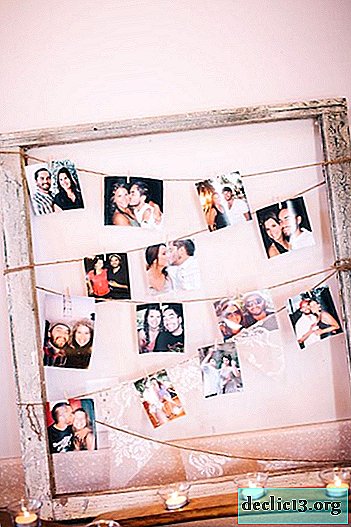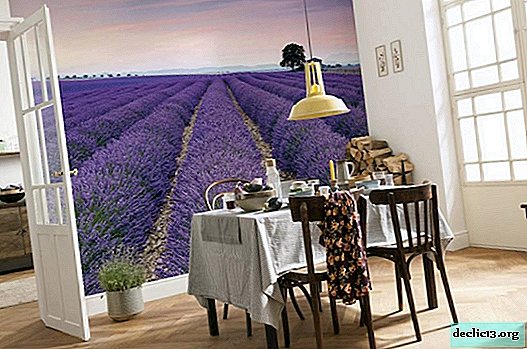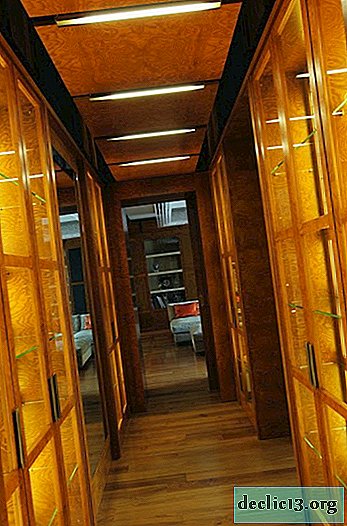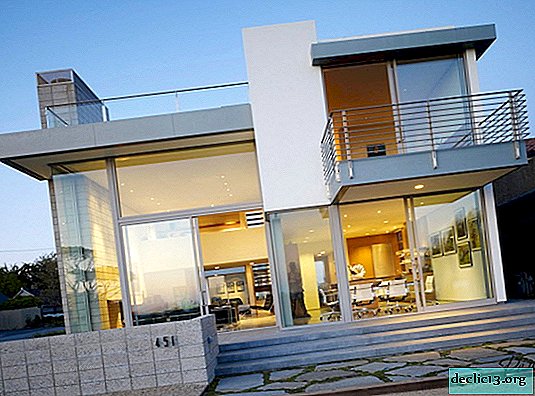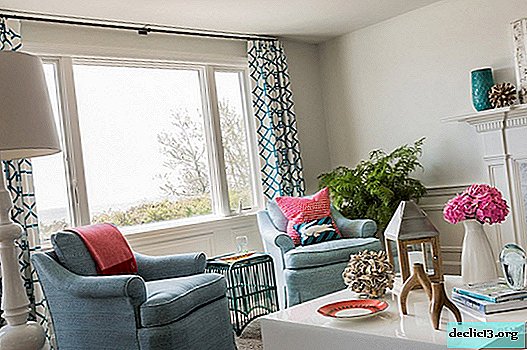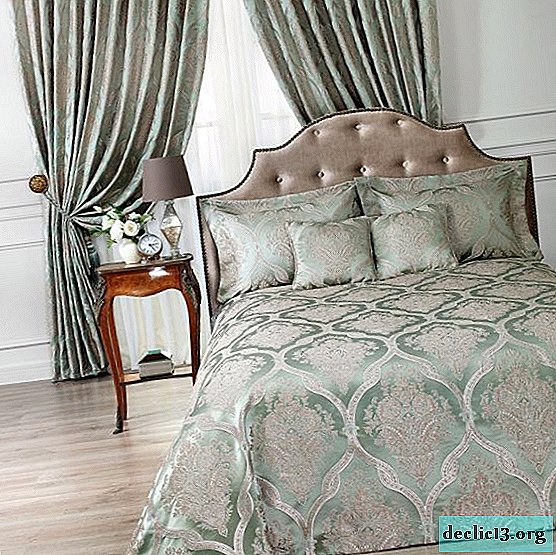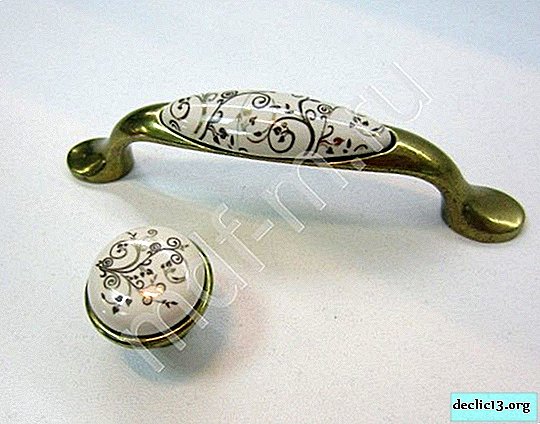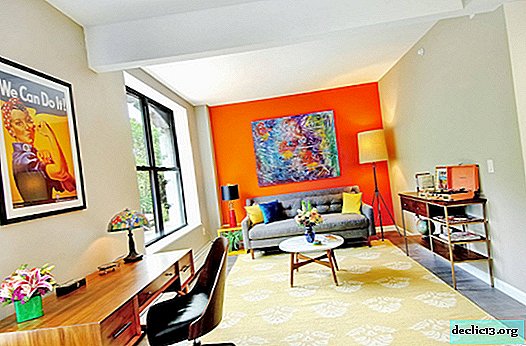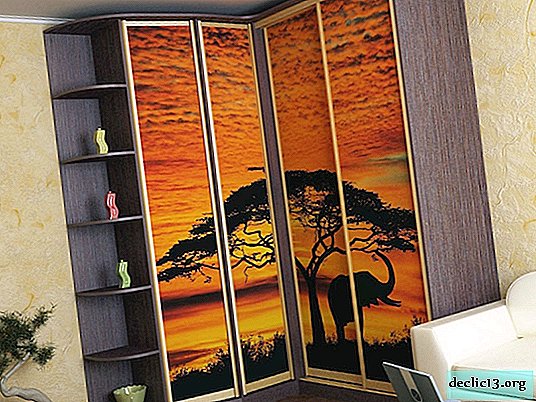Tapestry in the interior - 100 best ideas
Interior design with refined and practical textiles is one of the finishing touches to create a cozy and pleasant atmosphere of the home. Refined tapestries - textiles with a unique interweaving of threads - will help to give the room a special charm. An original ornament, an exclusive drawing or a plot picture on the fabric can change the whole character of the room’s interior, give it a tone or calm the atmosphere. The use of tapestries for decorating homes dates back to a deep history, at a time when paintings with the original weaving were made exclusively by hand, they required expensive raw materials and a lot of time for the master. It is not surprising that finished products were very expensive and only wealthy people could afford such a decor for their home.
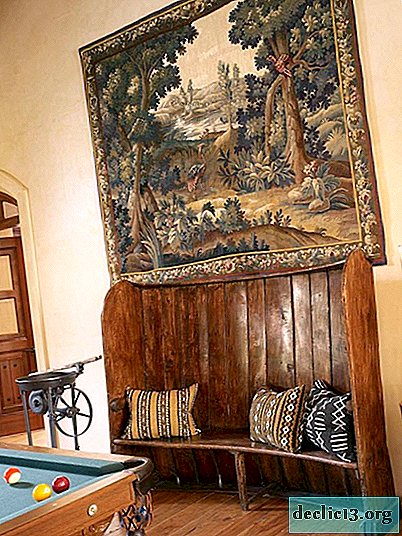

Nowadays, progress has taken upward over manual labor, significantly reducing the cost of the process of manufacturing tapestries, reducing the time needed for this by dozens of times and reducing the cost of the final product. Of course, the canvases created by modern robots are more perfect and more accurate than tapestries that people can create manually, but they do not store the warmth of human hands. This is probably why many collectors and lovers of antiques keep as a relic a hand-made textile decoration for walls, considering such a luxury item a good investment. Refined tapestries are passed from generation to generation, maintaining the status of a heirloom and becoming active participants in modern interiors.


In our impressive selection of design projects of rooms with different functional orientations, we would like to show you the options for using tapestries for interior decoration. Regardless of whether your exhibit is a creation of human hands or it was made on a modern conveyor, it is important to correctly and effectively enter the tapestry into the created interior. Although, there are also design projects that are created specifically for a particular work of textile art.


Story tapestry - where to hang?
Initially, tapestries served not only as decor for the walls, but also played the role of insulation. They can be safely called fabric carpets. Hand tapestries were woven of woolen and silk threads using gold and silver dyes. In Europe, the main motifs of fabric carpets were pastorals - scenes from life. Such tapestries often depicted landscapes with hunters, shepherds or walking girls. It is such plot products from textiles that we most often associate with the very concept of tapestry.


Another direction of creating textile paintings is associated with the East. From there, exquisite landscapes, images of flowers and plants came to us, among which sakura, birds and animals, portraits, beloved by many oriental masters. In such tapestries, gold threads, silk raw materials dyed with natural dyes were especially often used.



In the East, textile paintings were given special significance. Fabric scrolls served not only as a decoration for decorating a home, masters believed that they were able to drive evil spirits out of a home or attract positive energy, good luck and wealth.


Today tapestries are not only wall-mounted textile carpets, but also bedspreads, covers for decorative pillows, original panels and tablecloths, draperies for window and doorways and much more.

Narrative tapestries, reminiscent of those that our ancestors wove by hand, will look great in a classic living room. Golden threads in textile carpets are perfectly combined with the splendor of luxurious chandeliers and sconces, echoing the gilded decor elements of frames for mirrors and paintings.

If you have a fireplace in your living room or dining room, you can use the free space above it to place a story tapestry. Obviously, the hearth most often acts as the center of attraction of attention in the room, and with the support of the fabric picture, the entire ensemble will look especially impressive.

If you have not yet decided to hang a story tapestry in the rooms where you spend a lot of time, in the bedroom or living room, try using wall decor in additional rooms. A tapestry with a landscape will look great in a spacious hall or hallway. Some private houses and corridors have enough free space to use wall decor in the form of fabric carpets. The main thing is that there should be enough free space for viewing the entire textile picture.


Ornaments and abstraction - a unique design for a modern interior
If the plot tapestries in many of us are clearly associated with classical interiors, then for the use of ornamental textile paintings, the range of stylistic directions is expanding significantly. And it's not just about vintage or retro style. Tapestries with ornaments will organically look in rooms decorated in the style of shabby chic or Provence, eclectic room designs. But even such an industrial style as a loft is able to organically accept such decor as a wall tapestry. Here are examples of such a spectacular alliance.


Geometric tapestry ornament perfectly integrates into the modern style of room decoration. The use of black and white color combinations is becoming mainstream in the latest design projects of famous artists. Such textile carpets can act not only as a wall decor, but also serve as screens for zoning the space or draping window openings.




No less popular are tapestries with bright ornamental patterns. Colorful colors, clear lines, unusual combinations or smooth forms - for a light background of modern styling of interior design, such color is simply necessary to effectively raise the mood of the rooms.

The abstraction in the tapestry drawing is the main feature of modern trends in interior design. Unusual colors and shapes, original combinations and the apparent lack of plot allows you to create the image of the room, in the design of which modern fine art was used. Such fabric paintings look especially impressive in rooms with a light finish. Often the abstract tapestry plot becomes the only bright or motley color spot in the room.



Tapestries with a bright ornamental pattern look especially advantageous in modern rooms, which are increasingly decorated using light, pastel colors.




Examples of decorating rooms with different practical components
Bedroom
In ancient times, tapestries were hung at the head of the bed not only to decorate the wall, but also to insulate the bed. In poorly heated rooms had to fight not only with the cold, but also with dampness. Nowadays, the tapestry plays an exclusively decorative role, often becoming an accent element of the interior, attracting the attention of anyone entering the bedroom.


For the bedroom, it is better to choose tapestries with calm, pacifying energy. Luxurious landscapes, images of flowers, birds and animals will create a pleasant atmosphere for a relaxing sleep and rest. In this case, it is necessary to decide whether you want the tapestry to merge with the general color palette of the bedroom or act as a contrasting accent and how bright it can be. From the point of view of emotional relaxation, a bright, colorful tapestry will not prevent you from getting ready for bed if it hangs over the head of the bed.

Tapestry floral ornament is a great choice for decorating your bedroom. After all, the shapes and colors of plants can be tried to be repeated in the textile design of windows or a berth.


Many of our compatriots live in cities, where most of the time of the year outside the window is gloomy and damp. It is in bad weather that we lack warmth and coziness, bright colors for emotional nourishment and getting a boost of energy. That is the function that bright, colorful canvases on your walls can perform. Not many people decide to use bright colors in the decoration of rooms and such a precaution is quite logical. But you can hang a colorful panel with an unusual pattern on neutrally decorated walls and get an incredibly colorful, non-trivial interior as a result.



Especially valuable pieces of textile art are placed in special subframes or in frames with free margins. So you can enhance the effect of the presentation of the original pattern and protect the fabric from unwanted effects.

Among other things, the tapestry can be used to highlight a particular area in a spacious, multifunctional room. For example, in the bedroom you can highlight a boudoir area or a reading corner.


Living room
If you have a large tapestry at your disposal (it doesn’t matter whether it is handmade or made using the latest equipment), you can’t come up with a better place than the living room. In a classic living room or a room decorated in the neo-classic style, the plot tapestry will look organically, decorating the interior.



For those who do not want to use classic motifs in the design of the living room and prefer a modern style, there is a way to decorate the walls with tapestries. Choose a textile carpet with an original ornament, bright and colorful combinations and your living room will not be equal. If at the same time you manage to repeat some of the most colorful shades from the tapestry ornament in the textiles of sofa cushions, upholstery or drapery windows, the living room will have not only an original, but also a harmonious, balanced appearance.

Only one detail of the interior can change the whole image of your living room - a colorful tapestry. Vivid colors, an unusual pattern or original combinations can raise the degree of design, bring coolness or warmth, enthusiasm and positive, calm or tone.

For an eclectic living room decorated using different textures, colors and even the style of textiles, bright and colorful tapestries will be more than appropriate. Such a textile picture will support the general positive mood of the interior and will become a spectacular addition to the wall decor and not only.


If you need an original element of the interior that would clearly indicate the chosen style for decorating the living room - use a textile panel or a picture with the corresponding pattern. Here is an original way of performing a common room in a marine style.


Large fabric panels are able to accent any wall of the living room. if the colors of the tapestry are very bright, and the picture is expressive, then it is better to limit yourself to one such subject of wall decor. if in the performance of a textile pattern unobtrusive ones are used. Pastel shades and calm motives, you can compose whole compositions without fear of making the interior of the common room heavier.

Textile canvas can serve not only as a wall decor, but also protect the room from sunlight, acting as a screen or zoning the space, separating functional segments, but without interfering with traffic.

Cabinet and workshop
In an office or a library decorated in a classic style, a tapestry with a landscape will look most appropriate. A light background of walls is a good choice for the most effective representation of your family heirloom or a modern work of textile art.

The style of the chalet and the motifs of the "hunting lodge" are perfectly combined with the use of old tapestries as a wall decor. For such an office, it would be logical to use wooden finishes, hunting elements - animal heads on the walls or skins (albeit not natural, but imitating them effectively) as carpet flooring.


If you want to create a bright, tonic atmosphere in your office or workshop that will encourage you to work or be creative, use a fabric painting with a dynamic pattern, colorful colors, unusual combinations. But with this choice, it is better to limit the brightness only on the wall to avoid excessive variegation, from which it will be dazzled in the eyes.

If you need a calm, neutral environment for comfortable work or creative work, then choose gentle pastel shades for a picture in a textile picture. Images of nature, plants, static landscapes or calm ornaments in a non-colorful design will become a harmonious complement to the design of your workplace.


Kitchen and dining room
In order for the tapestry on the wall to look advantageous, to attract attention and present a clear picture, it is necessary to provide for it a plain neutral background. Here is an example of the design of the dining room, for the decoration of which the most neutral color was used - gray. Against such a background, an old tapestry looks luxurious.

Luxuriously, organically and at the same time restrainedly looks a tapestry in neutral colors, the colors and texture of which are repeated in the upholstery of the chairs of a traditional dining room. Massive solid furniture with beautiful carvings, exquisite tapestry, rich textiles - a great union for the design of a family room for meals.

Antique tapestries are too valuable to nail their wall. To place textile paintings, they usually use a special tripod (a kind of curtain rod for curtains), often it is decorated with carved caps to not only provide protection against tapestry slipping, but also to decorate the resulting composition.



Here is an example of using bright tapestries made of thin fabric along the side of the entrance to the dining room. On a snow-white background, colorful images look especially impressive.

It happens that the whole concept of interior decoration is built around one tapestry. As a rule, such a design element is a large textile pattern with a bright, original pattern or unusual texture. It was such a Wall Decor that became the center of attraction for all eyes in the next design project.

Children's room
Why not decorate one of the walls of the children's room with a bright go funny tapestry? If the room is decorated in neutral, light colors, then a bright, colorful picture of a textile picture can bring a positive mood and raise the degree of mood of the interior. If you know that your active child, on the contrary, needs objects in the interior of the room that encourage calm, then use a neutral ornamental pattern or a natural landscape in a calm color scheme.



